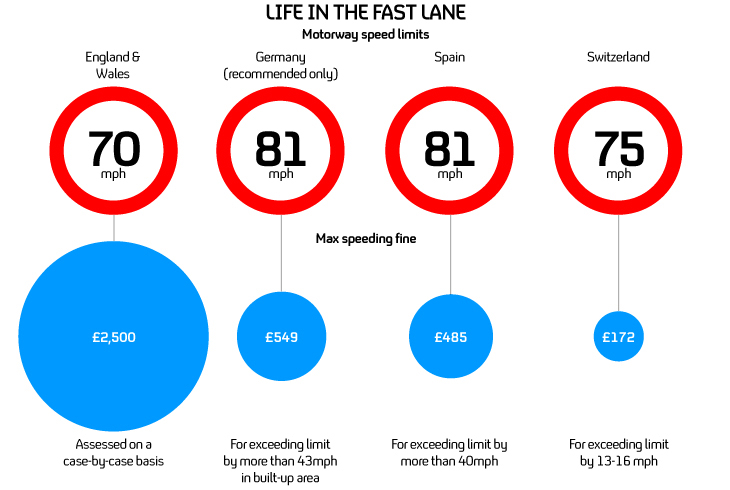Motorway speeding fines could hit £10,000
Maximum fines issued by magistrates are set to soar dramatically under the latest proposals for England and Wales, with huge increases in penalties for motoring offences. But would they work?
A fourfold increase is expected across the board in fines – known as levels – issued by magistrates’ courts, with a level four fine, given for speeding on the motorway, rising from £2,500 to an astronomical £10,000.
Meanwhile, a level one fine maximum, for offences such as unauthorised cycle racing on public paths, will increase from £200 to £800; level two, from £500 to £2,000, for driving a motorcycle without a helmet; level three, from £1,000 to £4,000, for selling alcohol to an already inebriated person, or being drunk and disorderly in public.
There’s no clear evidence that increasing penalties has any impact on changing behaviour. Neil Greig, Institute of Advanced Motorists
“We are toughening up sentencing across the board,” said Justice Minister Jeremy Wright. “These changes give magistrates the flexibility to suitably punish those who damage society through offences like selling alcohol to children, anti-social behaviour, being drunk and disorderly, operating as a rogue landlord or driving at excessive speeds.
“Financial penalties set at the right level can be an effective way of punishing criminals and deterring them from further offending. That is why we are updating the maximum levels of fines that can be issued for the first time in more than 20 years.”
If these proposals become a reality, magistrates could also have unlimited fining powers for those offences that currently abide by a maximum of £5,000 or more.
Maximum fines issued by magistrates are set to soar dramatically in light of the latest proposals for England and Wales.
A fourfold increase is expected across the board of fines – known as levels – issued by magistrates’ courts, with a Level 4 fine, given for speeding on the motorway, rising from £2,500 to an astronomical £10,000.
Meanwhile, a Level 1 fine maximum, for offences such as, unauthorised cycle racing on public paths, will increase from £200 to £800. Level 2, from £500 to £2,000, for driving a motorcycle without a helmet. Level 3, from £1,000 to £4,000, for selling alcohol to an already inebriated person, or being drunk and disorderly in public.
“We are toughening up sentencing across the board,” said Justice Minister Jeremy Wright. “These changes give magistrates the flexibility to suitably punish those who damage society through offences like selling alcohol to children, anti-social behaviour, being drunk and disorderly, operating as a rogue landlord or driving at excessive speeds.
“Financial penalties set at the right level can be an effective way of punishing criminals and deterring them from further offending. That is why we are updating the maximum levels of fines that can be issued for the first time in more than 20 years.”
If these proposals become a reality, magistrates could also have unlimited fining powers for those offences that currently abide by a maximum of £5,000 or more.
So would the prospect of a £10,000 fine stop motorists from speeding? Neil Greig, director of policy and research at the Institute of Advanced Motorists, the UK’s leading independent road safety charity isn’t convinced.
“There’s no clear evidence that increasing penalties has any impact on changing behaviour. Magistrates don’t tend to use the maximum fines so it’s unlikely that will change now.
“Our roads have never been safer but we need more traffic police out there to the catch the minority of people who are driving dangerously. The fear of being caught is much more important than a stronger penalty.”

How do England and Wales compare?
So would the prospect of a £10,000 fine stop motorists from speeding?
Neil Greig, director of policy and research at the Institute of Advanced Motorists, the UK’s leading independent road safety charity, is not convinced.
“There’s no clear evidence that increasing penalties has any impact on changing behaviour. Magistrates don’t tend to use the maximum fines so it’s unlikely that will change now.
“Our roads have never been safer but we need more traffic police out there to the catch the minority of people who are driving dangerously. The fear of being caught is much more important than a stronger penalty.”
-
Latest news
-
Fuel poverty: Can Tories hang onto seats as energy bills fall?3m

-
UN top court orders Israel to ‘immediately’ halt Rafah offensive2m

-
Jeremy Corbyn expelled from Labour after declaring he will stand as independent3m

-
Scotland ‘vital’ to forming next Labour government, says Starmer8m

-
‘Former Post Office boss will never cry as much as our families’, says wrongly accused sub-postmaster6m

-




